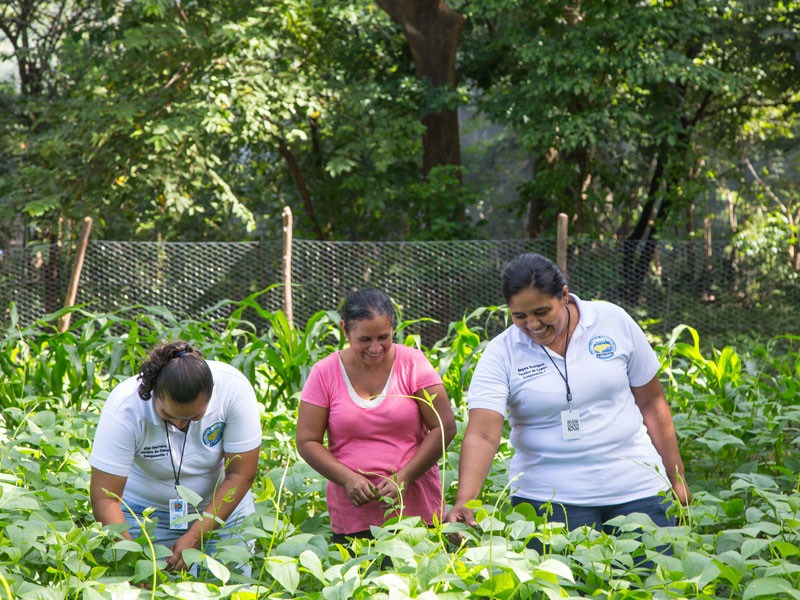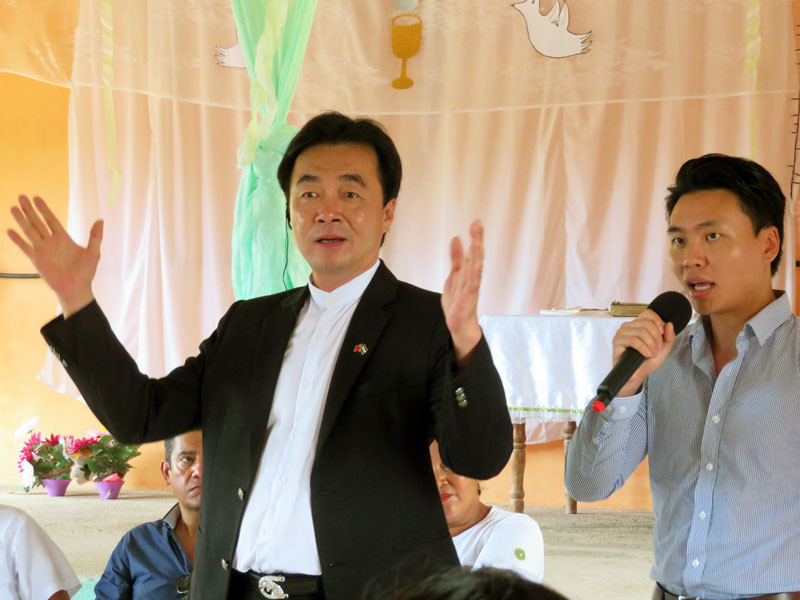A small seed opens big opportunities for farmers in Honduras
By Evelyn Rupert and Amalia San MartínOctober 3, 2018
Taiwanese company partners with farmers to produce sesame in the Dry Corridor
A group of farmers in southern Honduras are trying their hand at cultivating a crop not commonly found in the region: sesame.
While crops such as corn, beans, squash, melons and cashews are typically found in both commercial and family fields across this stretch of Honduras, an effort to plant sesame is bringing farmers a new source of income and the possibility of tapping into a profitable value chain and export market.
The Dry Corridor Alliance (ACS) – PROSASUR program has developed agricultural business plans for farmers that place emphasis on high-value crops and improving household conditions. As part of these business plans, the program has partnered with a Taiwanese company called the Dong Jyu Group, which is providing a group of 52 farmers with the seeds, fertilizers and pesticides to grow sesame crops in the municipalities of El Triunfo and Namasigue.

“It is a pleasure to be involved in the production of sesame seeds, and the community will be very happy to see this become a reality,” said farmer José Vivian Varela, speaking on behalf of the group of sesame producers at a launch ceremony held in El Triunfo on Sept. 13. “We are very proud to be here with government officials, the Ministry of Agriculture, ACS-PROSASUR and our friends from Taiwan.”
The sesame initiative and agricultural business plans contribute to the ACS-PROSASUR program’s efforts to raise the incomes of smallholder farmers in 12 municipalities across the Dry Corridor – a region named for its extended periods of drought.
ACS-PROSASUR is implemented by Creative Associates International in partnership with INVEST-Honduras and is funded by the Global Agriculture and Food Security Program through the World Bank.
The partnership with the Dong Jyu Group was established as an initiative of the Honduran Department of Economic Growth. It is supported by the Department of Agriculture and Livestock’s Office of Agricultural Science and Technology, directed by Guillermo Cerritos.
A steady income for farmers
Under the agreement, Dong Jyu Group providing farmers transportation, a daily meal and a weekly wage to cultivate sesame crops, and they’ll earn additional income when the sesame is harvested in a few months.
ACS-PROASASUR is facilitating agreements between Dong Jyu Group and individual producers. The program will provide training to the farmers and visit the plots every 15 days to give assistance and monitor progress.
Each of the 52 producers planted approximately 1 hectare of sesame in August, which are each expected to yield 2,240 pounds of product in December – a total of more than 116,000 pounds of sesame.
Donald Lin, president of Dong Jyu Group, said the partnership will allow farmers to grow a lucrative crop and earn a steady income without taking on any of the upfront costs of planting or risk of the harvest being spoiled by disease or drought. And sesame’s export value is higher than that of other common exports like cashews and cantaloupe.

“I want to bring the success that we’ve had in Taiwan and share it with all of you,” Lin said to the producers. “You won’t have to buy seeds, you won’t have to purchase fertilizer, and you won’t have to wait four months until the harvest to receive an income.”
In the Dry Corridor, where climate change and phenomena like El Niño and La Niña exacerbate yearly lengthy droughts, some 90 percent of the population live on less than $2 a day. Many families rely on subsistence farming or small profits from agricultural production, but the drastic swings between heavy rainfall and drought are an annual danger to harvests.
ACS-PROSASUR Chief of Party Carlos Ruiz said that while planting sesame may be foreign to many farmers, the new crop can help improve the livelihoods and raise wages of its growers.
“This is a historic day because it is a new way of doing business and a new way to generate income for the family … We firmly believe this effort will improve the livelihoods of our families,” he remarked. “We want to thank our producers and encourage them with this new business model.”
Planting resilient crops
In 2018, a particularly hot and extended period of “canícula,” a stretch of extreme heat during the rainy season, caused Honduras to declare a state of emergency, and the government estimated that some 65,500 families in the Dry Corridor required emergency food assistance. Many municipalities lost most of their harvests.
ACS-PROSASUR and Dong Jyu Group hope that farmers in the region can become more resilient to the extreme climate with drought-resistant crops like sesame.
“Sesame seed is a plant that does not need much care to be productive … This product was chosen because it is low risk but has a worldwide demand and a lot of potential in this region,” said Dong Jyu Group Project Development Manager and Special Assistant to the President, Willis Yang. “We are very pleased because we know we’re doing something that will trigger a change in the lives of families.”
Once the initial group of producers adopt and adapt to a new crop and have a successful first harvest, Dong Jyu Group hopes to introduce more Dry Corridor farmers to sesame – and potentially begin raising household incomes through other agricultural products.
“We’re starting with one small sesame seed, but we hope to expand and introduce other crop alternatives in the future,” said Chief of Party Ruiz.

